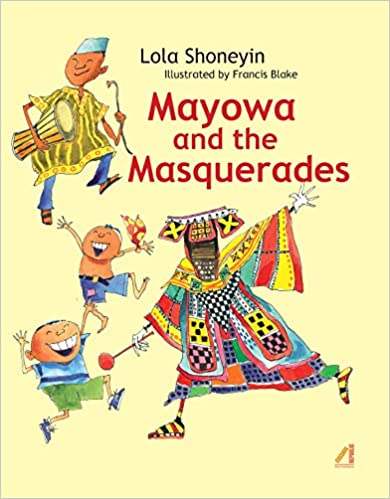Mayowa and the Masquerades
 Mayowa and the Masquerades
Mayowa and the Masquerades
Picture Book / Ages 5-8 / Nigeria / Yoruba
Cassava Republic Press
April 14, 2020
32

A fun story about discovering that there is more to life than computer games!
English with a few Yoruba town locations and vocabulary words: Ilisan, yeye tree, batá drum. Picture book, suitable for 3-8 years.
Mayowa and the Masquerades is the story of the importance of teaching and learning about cultural identity and traditional practices among the Yoruba of southwest Nigeria. The tale is set in contemporary 21st c. Nigeria, where a young, happy, and inquisitive boy, Mayowa, lives in the bustling city of Lagos, the largest metropolis in Nigeria, with his Yoruba parents.
Mayowa and the Masquerades traces a long weekend day when Mayowa’s plan to play his favorite computer games must be cancelled because his family is driving more than forty miles to visit his Granny in the town of Ilesan. Mayowa knows that a wi-fi connection is not reliably available in many of the countryside towns outside of the city. As the family leaves Lagos at mid-morning, Mayowa ignores his parent’s conversation and instead stares out the car window. After a long, nearly two-hour car ride with Mayowa sulking in the back seat, the family finally arrives.
Granny comes outside to welcome everyone. Traditional Yoruba greetings are extended. In Nigeria, the utmost respect for your elders must be properly shown. To greet much older people like grandparents, you are expected to fully bend your knees and have them touch the floor. With parents and other familiar people, it’s ok to curtsy with bended knee, although some might insist on the knees touching the floor. For men and boys, they are expected to prostrate, lie down flat on the floor to greet[.]Mayowa and his father do greet Granny this way, while his mother bends at one knee in a smaller, acceptable gesture.
To Mayowa’s surprise, his Granny has arranged for him to spend the day with her high-spirited young neighbor, Denuyi, that includes attending a community masquerade parade. The two boys go off together to explore the countryside. Along the way they chase and catch a grasshopper, stop by a stream to cool off from the hot sun, visit Denuyi’s father’s farm and are invited to see his flock of chickens and his sow with her piglets. Together they climb a yeye tree and eat some of the ripe yellow fruits.
Soon they hear drumming, music and singing and the boys realize that the masquerade festival is nearby. Although not specified in the book, this masquerade is known as egungun. Yoruba cultural traditions incorporate annual ceremonies in honor of their deceased elders and important relatives. This festival serves as a means of assuring their ancestors a place among the living and commemorating ties to past generations.
The boys run to join in with the dancers, whose costumes are colorful panels of layered cloth and Denuyi explains to Mayowa that they represent their Yoruba ancestors. “During the festival, they return to the world to dance with their loved ones” (p.16). They meet a drummer, who is playing a bata drum, the two-toned double-headed drum, that can imitate the tonal quality of the Yoruba language, and Denuyi performs some of the praise poems. The boys lose track of time and after several hours of dancing, they find themselves alone in the performance area. A kind man points them in the direction home to Ilisan.
At the end of the exciting afternoon, the boys find their way back to Granny’s house in Ilisan. Denuyi is exhilarated but tired and waves goodbye as Granny walks Mayowa through her garden to his parent’s car. Along the way she explains that nature, birds, animals and plants, also have their own daily rhythms and cycles. Granny gives the family a variety of good foods: plantain, beans, dried fish, mangoes, and peanuts; all loaded into the car for the trip back to the city. Mayowa enjoyed his time so much that he forgot that he wanted to play his computer games and he falls quickly into a very contented sleep on the way back to Lagos.
Lola Shoneyin, a major poet, prize-winning Nigerian author and arts festival director, teaches the importance and value of one’s cultural identity and heritage, especially within the context of our contemporary lives. The author wisely introduces a peer-to-peer interaction between the two adventurous boys, so that Mayowa can learn to respect and enjoy his living heritage through a lens of excitement and fun!
This reviewer would have liked the author to have introduced more Yoruba words: such as dundun, a talking or pressure drum illustrated on the cover; lafun, cassava flour being sold by women on the roadside; and especially important would have been the use of egungun, the traditional Yoruba ceremony that is a central part of the ancestral masquerade story. The illustrator, Francis Blake, has nicely included three different styles of egungun costumes with their colorful cloth panels, nimbly illustrated in watercolor and ink. However, throughout the book, Blake’s style fails in depicting persons of color and fraught with unfortunate design choices. Both Mayowa and Denuyi unfortunately at times evoke old stereotypes of Asians with oversized teeth and slanted eyes and his choice of oranges and yellows for skin tones feels especially discordant.
Recommended for fostering important themes of the value of cultural identity, heritage, family, and community.
Reviewed by Deborah Stokes, M.A. Curator for Education, Smithsonian National Museum of African Art (Retired)
Published in Africa Access Review (October 7, 2021)
